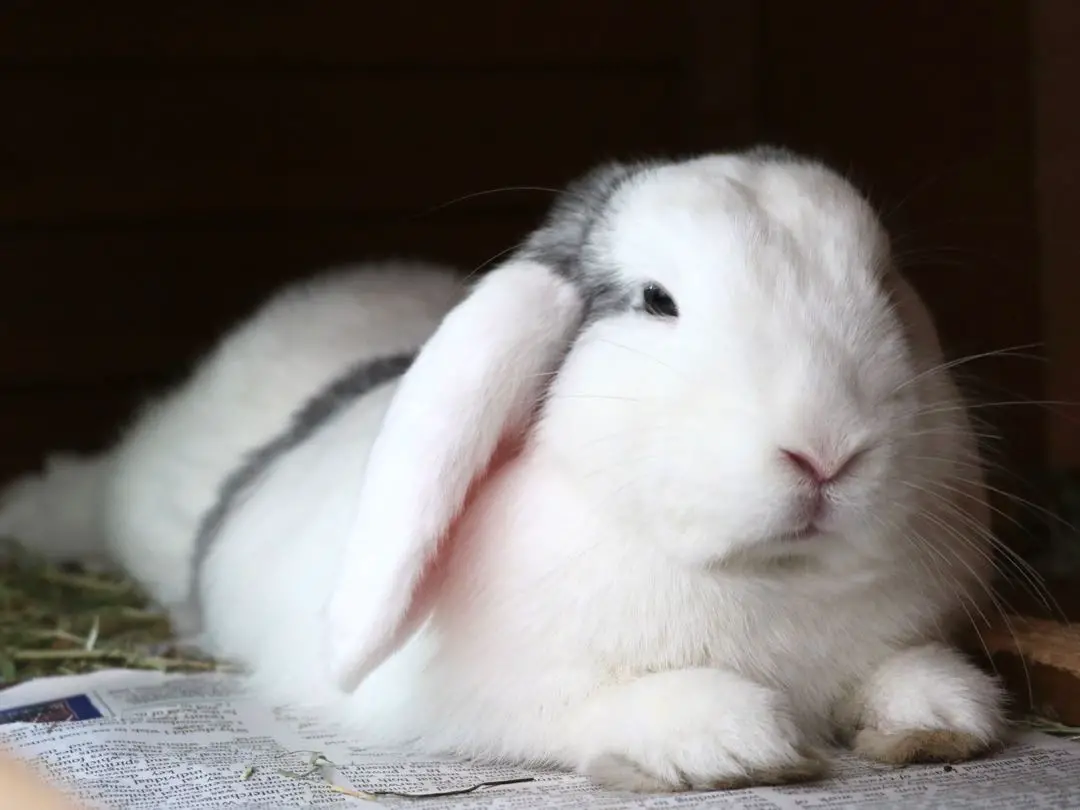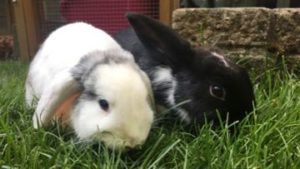Introduction
Whether you are thinking about getting a new rabbit, or just trying to understand your pet bunny better, you might be wondering about a typical daily routine. And, just as we humans need our beauty sleep, so getting some sleep is important for rabbits.
But when and how do rabbits sleep? Rabbits are crepuscular – they are most lively at dawn and dusk, and get their sleep (typically around 11 hours a day) during the middle of the day and also at night.
Because people see rabbits sleeping during the day, many assume that they are nocturnal – awake all night. But they aren’t. Crepuscular comes from a Latin word meaning ‘twilight’. This is the time of day (at both dawn and dusk) that rabbits feel most secure feeding and being active.
Bunnies are prey animals – always looking out to make sure that a nasty predator isn’t out to get them. As many predators work best either in bright daylight or at night, feeding in twilight helps decrease the danger. It also means that they aren’t around in the heat of the middle of the day (rabbits can find it hard to regulate their body temperature when it gets too hot).
How many hours do rabbits sleep?
Rabbits sleep on average anything from seven to twelve hours a day. But their sleep pattern is different from ours. Because they have to be alert to danger, bunnies are light sleepers. They frequently wake up, having shorter periods of sleep.
A common number you will come across on the web is 8.4 hours. But scientists measured the sleep patterns of some adult male rabbits. They found that the rabbits slept on average for 11.4 hours a day.
The scientists even broke down the type of sleep.
The rabbits were in deep sleep about two-thirds of the time asleep. So about seven or eight hours a day.
The rabbits were in a light sleep – what the scientists termed drowsy – about a quarter of the time. So about two or three hours a day.
About a tenth of the time the rabbits were in what the scientists termed ‘paradoxical sleep’ – this is similar to REM sleep in humans, and may be an indication that this is when the bunnies are dreaming! See below for more on this.
You can access the abstract of the journal article here.
Other studies also show similar results (eg in one study the rabbits averaged nearly 10 hours a day asleep).
How do you know when a rabbit is sleeping?
But how do you know when your bunny is sleeping? The scientists used sophisticated polygraphic recordings, but our pet bunnies aren’t wired up. It can be hard to tell if your rabbit is simply lying still, or actually asleep.
Here are five signs that your bunny is sleeping.
- They will be still. Rabbits don’t move around while asleep, though they can fall asleep in many different types of position.
- The ears will be relaxed. This can be harder to tell if you have a lop – they can always look relaxed! But if your rabbit’s ears are pricked up, this is a sign that they are awake. When sleeping, the ears will be lying against the head.
- The nose won’t be twitching. Rabbits wiggle their noses all the time while they’re awake, but not when asleep.
- The breathing will be slower. You won’t be able to notice this unless you are close. Just like humans, rabbits breathe more slowly while asleep.
- Just like some humans, some rabbits snore while sleeping.
Do rabbits dream?
We can’t be sure what is going on in their heads. But it looks like they do dream. About ten percent of their time asleep is spent in a specific form of sleep, in which the body’s patterns look similar to wakefulness patterns, but the brain is asleep. Eyes can move fast (hence it is sometimes called Rapid Eye Movement sleep, or REM sleep for short). And the body can twitch or jerk around a little.
This is similar to humans. We have different sleep states, and REM sleep is when we are dreaming (if you ever remember a dream, it is because you woke up during REM sleep). We too can twitch a bit during this state, and move around.
So it looks like rabbits do dream – we just can’t tell what they’re dreaming about.
Can rabbits see while sleeping?
If rabbits can sleep with their eyes open, does this mean they can see while asleep? Not necessarily. But it does have advantages for them. Potential predators might think that they are awake. Also, if there is movement, the rabbit is more sensitive to the change in light, and so more likely to wake quickly and respond.
Do rabbits sleep in the dark?
Rabbits sleep both in the day and at night, so they sleep both in the dark and in the light. They use the cues from the light to tell them when to sleep – when it is darkest and when it is lightest.
What positions do rabbits sleep in?
Rabbits can sleep in a whole variety of positions. Some flop on their sides, and others splay themselves out. This is Fish’s favourite position.
Partly it can depend on the weather. In cold conditions, rabbits are more likely to curl up into a ball when sleeping to keep warm. In hot weather, your bunny may stretch out as much as possible to keep cooler.
Do rabbits like to sleep with other rabbits?
Rabbits are highly sociable creatures, and most love to sleep with other rabbits (once they know each other). This is one of the reasons that it is good to have to rabbits rather than just one. Our bunnies Fish and Chips like to sleep close together.
Can you sleep with your bunny?
Some rabbits live indoors. If you have an indoor rabbit, you may wonder whether it is possible for an owner and rabbit to share a bed. There are a number of important considerations.
The biggest factor to consider is the safety of your bunny. You are much bigger than they are. If you roll over in your sleep, you could crush your rabbit, injuring or even killing it.
Doctors don’t recommend that parents and babies share a bed for similar reasons.
But there are other things to think about as well.
One of these is hygiene. Rabbits like to mark their territory with both scent and urine. Additionally, they can carry germs into the bed.
Also, rabbits have different temperature needs from humans. We like warmer temperatures, and use duvets or covers to keep up the temperature. Rabbits prefer cooler temperatures, and already have a coating of fur. What is ideal for you may simply be too hot for your rabbit.
Another factor to consider is the sleep cycle. Rabbits have shorter periods of sleep than humans, so while you are trying to get your beauty sleep your rabbit may be nudging you and wanting attention and to play.
Consider the height of your bed. You also need to think about how easy it is for the bunny to get on and off the bed. If yours is really low to the floor, it may be fine, but a standard bed height is high for a rabbit to be expected to jump up or down.
You also need to think about your own health. If you have asthma or allergies, sleeping with a furry animal may not be a good idea!
For all these reasons, you should at least think extremely carefully before planning on sleeping in the same bed as your bunny.
Instead, you could create a sleeping area near or next to your bed. This could be safer for your bunny, and better for both of you.
Conclusion
Your rabbit needs their beauty sleep just like you. But rabbits sleep day and night in shorter bursts, sometimes dreaming. They are most active at dawn and dusk.
If you want to find out more about activity times for rabbits, check out our post on whether rabbits are nocturnal.
Ever wondered whether bunnies yawn when they’re tired like we do (and what yawning does)?
Has your bunny woken up and wants something to do? Have a look at our top toys for rabbits – all cheap, and all road-tested by ours.
You might be wondering how well rabbits see at night – find out more about how rabbits see the world in our article.
Is your bunny listening to you? Find out more in our guide to how rabbits hear.
Worried if your rabbit can go out in the rain? Find out in our article here.
Worried if it’s getting too cold for your bunny? Check out how cold is too cold for rabbits in our article here.


